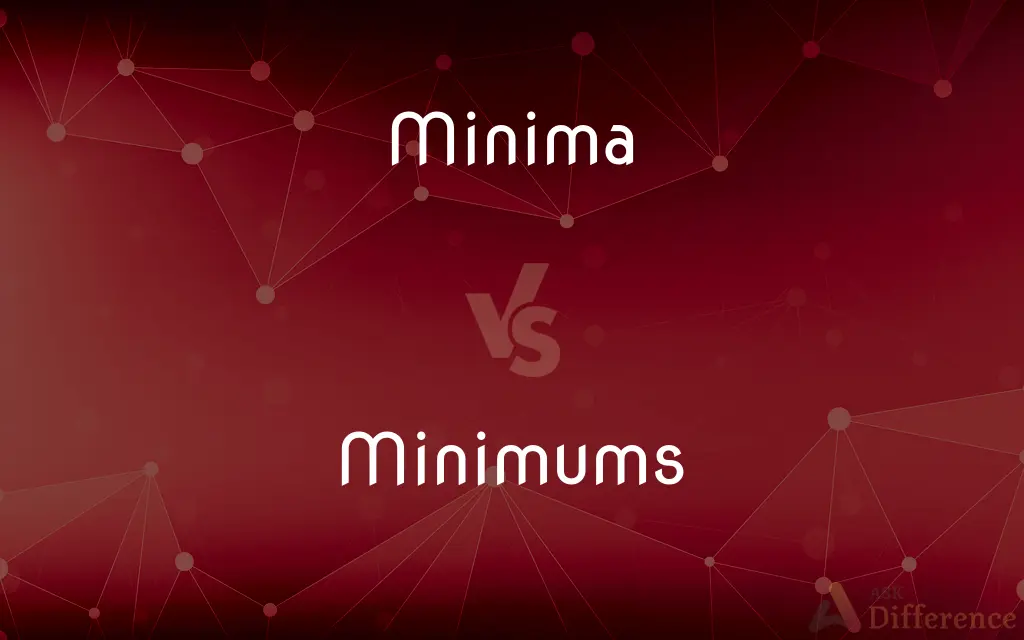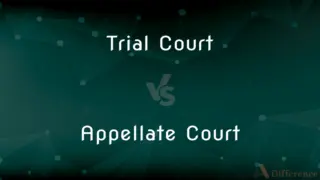Minima vs. Minimums — What's the Difference?
By Maham Liaqat & Fiza Rafique — Updated on April 3, 2024
Minima refers to the plural of 'minimum,' emphasizing the lowest points in mathematical or scientific contexts, whereas minimums serve as the general plural, used in broader, everyday language scenarios.

Difference Between Minima and Minimums
Table of Contents
ADVERTISEMENT
Key Differences
The term "minima" is primarily used in technical, mathematical, and scientific contexts to denote the lowest points or values in a given set or function. For instance, when discussing the points on a graph where a curve reaches its lowest value, "minima" is the preferred terminology. Minimums, on the other hand, is employed in more general contexts and can refer to the lowest amounts or levels of anything, from temperatures to prices, in everyday language.
While "minima" often appears in discussions about calculus, physics, or optimization problems, indicating precise points of minimal value, "minimums" is more likely to be found in conversations about minimum wage, minimum requirements, or minimum temperatures. This distinction highlights the more specialized use of "minima" versus the broader applicability of "minimums."
In academic writing or professional publications within the fields of mathematics, physics, and engineering, "minima" is the preferred term when referring to multiple instances of the lowest measure or degree. Conversely, in casual conversation, news reports, and non-scientific literature, "minimums" is commonly used to communicate the concept of the lowest permissible or possible measures.
The choice between "minima" and "minimums" also reflects the speaker's or writer's familiarity with the subject matter. Using "minima" correctly in a scientific context can signal a deeper understanding of the topic, whereas "minimums" is more accessible and widely understood by the general public, making it suitable for a variety of non-specialized discussions.
Despite these differences, both terms share the core concept of "the least" or "the lowest," serving to convey the notion of minimal amounts, values, or levels across different fields and contexts. This shared foundation underlines the importance of context in choosing the appropriate term to accurately communicate specific meanings.
ADVERTISEMENT
Comparison Chart
Context
Technical, mathematical, scientific
General, everyday language
Usage
Lowest points or values in a set or function
Lowest amounts or levels of anything
Fields
Calculus, physics, optimization problems
Non-scientific contexts, everyday situations
Indication
Precision in minimal value
Broad applicability of the concept of the least
Audience
Specialists in scientific or mathematical fields
General public, non-specialists
Compare with Definitions
Minima
Used in discussions about optimization and analysis.
Identifying the minima is crucial in optimizing the chemical reaction process.
Minimums
General term for the least amount or degree in various contexts.
The store has set new minimums for free shipping.
Minima
Lowest points in a mathematical function or scientific context.
The graph of the function displays several local minima, indicating points of least value.
Minimums
Reflects a broader, more accessible use.
The club enforced dress code minimums for entry.
Minima
Specific to fields requiring precise terminology.
The study's findings include two significant minima that influence the system's stability.
Minimums
Commonly used in everyday language.
Winter brings the annual minimums in temperature.
Minima
Indicates a deep understanding of mathematical concepts.
Through calculus, we can find the minima of this curve.
Minimums
Applies to a broad range of topics.
Meeting the minimums for application requirements is the first step.
Minima
Reflects technical precision in language.
The paper explores the minima of the wave function in quantum mechanics.
Minimums
Used in casual and non-technical discussions.
This week's forecast predicts night-time temperature minimums dropping below freezing.
Minima
A plural of minimum.
Minimums
The least possible quantity or degree.
Minima
Plural of minimum
Minimums
The lowest degree or amount reached or recorded; the lower limit of variation.
Minimums
A lower limit permitted by law or other authority.
Minimums
A sum of money set by a nightclub or restaurant as the least amount each patron must spend on food and drink.
Minimums
The smallest number in a finite set of numbers.
Minimums
A value of a function that is less than any other value of the function over a specific interval.
Minimums
Of, consisting of, or representing the lowest possible amount or degree permissible or attainable.
Minimums
Plural of minimum
Common Curiosities
Where is the term minima most commonly found?
Minima is most commonly found in technical, mathematical, and scientific literature and discussions.
What does minimums refer to?
Minimums refers to the least amounts, levels, or degrees of anything in a broad range of contexts.
What is the difference between minima and minimums?
Minima is used in scientific and mathematical contexts to refer to the lowest points, whereas minimums is the general plural form used in everyday language.
How does the choice between minima and minimums affect communication?
Choosing the correct term helps clarify the context and precision of the discussion, with minima indicating technical specificity and minimums indicating a broader, general concept.
Is one term more correct than the other?
Neither term is more correct; the appropriateness depends on the context of the discussion or writing.
How can someone learn to use minima and minimums correctly?
Understanding the context and audience of the discussion or writing can guide the correct use of each term.
Can minima and minimums be used interchangeably?
While they share a core meaning related to "the least," their use depends on context; minima for technical discussions, and minimums for general use.
What is a common misunderstanding about these terms?
A common misunderstanding is that they are completely interchangeable without consideration for the context in which they are used.
Does the distinction between minima and minimums matter outside technical fields?
In everyday language and non-technical discussions, the distinction is less critical, though using the correct term can enhance clarity.
How do minima and minimums relate to maximums?
Just as minima and minimums refer to the lowest points or levels, maximums refer to the highest points or levels, serving as the opposite concept.
How does understanding these terms benefit someone?
Understanding the difference enhances precise communication in specialized fields and everyday situations, ensuring clarity of meaning.
Are there specific fields where minima is exclusively used?
Yes, fields like mathematics, physics, and engineering often exclusively use minima to describe lowest points or values in a precise context.
What is an example of incorrectly using minima in a sentence?
Saying "The store has new minima for free shipping" is incorrect because it applies a scientific term in a general context.
Can minimums be used in a scientific context?
While minimums can technically be used, minima is preferred for clarity and precision in scientific contexts.
Are there languages where minima and minimums are not differentiated?
Some languages may not differentiate as clearly between the scientific and general plural forms of "minimum," depending on their grammatical structure.
Share Your Discovery

Previous Comparison
Extensive vs. Expansive
Next Comparison
Tend vs. TendencyAuthor Spotlight
Written by
Maham LiaqatCo-written by
Fiza RafiqueFiza Rafique is a skilled content writer at AskDifference.com, where she meticulously refines and enhances written pieces. Drawing from her vast editorial expertise, Fiza ensures clarity, accuracy, and precision in every article. Passionate about language, she continually seeks to elevate the quality of content for readers worldwide.
















































